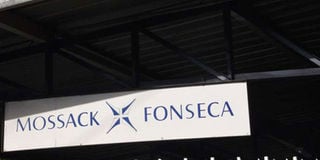What leaked Paradise Papers mean for Kenya

View of the facade of the building where Panama-based Mossack Fonseca law firm offices are in Panama City, on May 9, 2016. In April last year, some leading newspapers published information linked to documents leaked from the firm. PHOTO | RODRIGO ARANGUA | AFP
What you need to know:
- Panama is not just a tax-free zone, but also one of the biggest tax havens in the world.
- Pressure is mounting on governments to allow global tax reform, with investigations into tax evasion going on in several countries.
A former head of the public service, Dr Sally Kosgei, has been mentioned in a new wave of offshore leaked documents, The Paradise Papers.
The papers indicate that Dr Kosgei, the Taita-Taveta University chancellor, used a Mauritius-based company to buy apartment buildings worth more than Sh100 million in central London.
Last year, another set of documents, popularly known as “the Panama Papers”, implicated another 191 wealthy Kenyans in stashing away money on the island of Panama.
Those named included former Imperial Bank chairman Alnashir Popat, a former managing director of the National Oil Corporation Kenya, Mr Mwendia Nyaga, and former Deputy Chief Justice Kalpana Rawal.
MOSSACK FONSECA
Justice Rawal is believed to have transacted more than Sh250 million worth of property across Europe in 2012.
In April last year, some leading newspapers published information linked to documents leaked from one of the largest offshore law firms based in Panama.
The confidential documents detailing dirty business deals were traced back to the 1970s and were held by Mossack Fonseca, a Panamanian law firm.
They included more than 11 million documents, emails, names of directors of foreign companies and contract negotiations.
They were by far the largest data leak in history and they became known as the “Panama Papers”.
LEAK
Historically, Panama has been known as the cornerstone of world trade.
The country moves thousands of ships through the Canal, but the leaks also show that it is engaged in a web of corruption and a lot of illegal cash.
Panama is not just a tax-free zone, but also one of the biggest tax havens in the world.
Others include the British Virgin Islands and the Bahamas.
So, how did the papers leak? A stranger called into the offices of a German newspaper and said that he had encrypted data to share but his life would be in danger if his identity was revealed.
NEWSPAPERS
The stranger agreed to chat on encrypted files with no face to face meeting.
He asked for no compensation, saying that his life would be fulfilled if the world found out that a Panamanian law firm was behind one of the world’s biggest financial crimes.
The documents were obtained from a law firm of Jürgen Mossack and Ramon Fonseca in Panama City.
It would take one newspaper 25 years to read through all the documents and make some sense.
The data included more than 240,000 companies, trusts and foundations with 14,000 clients worldwide.
So, the German newspaper decided to share with other news organisations across the world.
TAXES
The collaboration across 40 countries and 400 investigative journalists took about 12 months to read through the documents and publish coordinated stories. The leaks were published on April 16 last year.
However, Mr Fonseca, co-founder of the law firm, in an interview following the leak, defended the business, stating that “we take care only of the legal part”, alluding to the fact that it is difficult to separate criminals from other individuals who seek services.
The documents revealed how the world’s powerful men and women use offshore accounts to conduct business, avoiding paying taxes.
It has been argued that people open these kinds of businesses for genuine reasons such as protecting their identity against kidnappings, currency fluctuations, competition and for privacy.
CRIMINALS
However, criminals, billionaires, politicians and other corrupt individuals use these privileges to conceal their earnings and engage in money laundering.
To an ordinary Kenyan, corrupt deals across borders may not make sense.
But it is worth mentioning that the Kenyans named avoid paying taxes at home.
The leaks have become publicly embarrassing to many foreign leaders.
Those mentioned, included the leaders of Russia, Ukraine, United Kingdom, Iceland and Argentina and sports and movie stars.
REFORMS
However, the blame lies in the hands of powerful nations such as the United States that have refused to join the Common Reporting Standard (CRS).
The law was formulated for transparency within the Organisation of Economic Corporation and Development (OECD) countries to streamline tax reporting systems across the member countries.
It was founded so that countries share tax data to combat global tax evasion.
Pressure is mounting on governments to allow global tax reform, with investigations into tax evasion going on in several countries.
Dr Kanani is a Kenyan consultant in organisational leadership and public policy based in the United States. [email protected]




